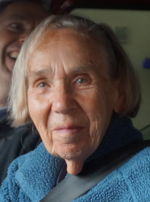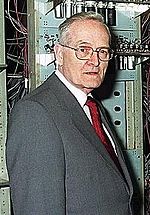The Ferranti Mark 1, also known as the Manchester Electronic Computer in its sales literature, and thus sometimes called the Manchester Ferranti, was produced...
17 KB (1,834 words) - 01:13, 25 September 2024
commercial computer from the mid-1950s built by Ferranti. It was the successor to the Ferranti Mark 1, adding a floating point unit for improved performance...
7 KB (843 words) - 15:17, 2 June 2022
consumption. The first commercially available stored-program computer, the Ferranti Mark I, contained 4050 valves and had a power consumption of 25 kilowatts...
39 KB (4,364 words) - 15:43, 19 December 2024
Computer (section Input/output (I/O))
November 2008. "Our Computer Heritage Pilot Study: Deliveries of Ferranti Mark I and Mark I Star computers". Computer Conservation Society. Archived from...
139 KB (14,042 words) - 20:03, 7 December 2024
1998, p. 25. Our Computer Heritage Pilot Study: Deliveries of Ferranti Mark I and Mark I Star computers., Computer Conservation Society, archived from...
170 KB (17,676 words) - 17:16, 17 December 2024
attempted to convert the program into executable code for the 1951 Ferranti Mark 1 computer in Manchester, but was unable to do so. Turing played a match...
19 KB (2,102 words) - 02:26, 15 May 2024
computers. After Ferranti was awarded a contract to build a production version of the Manchester computer, which would become the Ferranti Mark 1, Prinz worked...
8 KB (747 words) - 06:29, 16 March 2024
was scrapped towards the end of 1950, replaced in February 1951 by a Ferranti Mark 1, the world's first commercially available general-purpose electronic...
27 KB (3,477 words) - 18:46, 18 April 2024
National Anthem that was programmed by Christopher Strachey on the Ferranti Mark I, late in 1951. Later that year, short extracts of three pieces were...
154 KB (16,764 words) - 08:34, 19 December 2024
Ferranti's Argus computers were a line of industrial control computers offered from the 1960s into the 1980s. Originally designed for a military role,...
28 KB (3,640 words) - 23:43, 11 May 2024
LEO (computer) (redirect from LEO I)
Simplified Coding Scheme for AMOS". The Computer Journal. 2 (2). AMOS - Ferranti Mark I*: 55–58. doi:10.1093/comjnl/2.2.55. ISSN 0010-4620. "Creative Computing"...
23 KB (2,605 words) - 15:00, 4 August 2024
Mary Lee Woods (category Ferranti)
the Department of Computer Science, University of Manchester Mark 1, Ferranti Mark 1 and Mark 1 Star computers. She was the mother of Sir Tim Berners-Lee...
14 KB (1,530 words) - 01:03, 4 December 2024
optical memory Notes Kilburn, Tom (1990), "From Cathode Ray Tube to Ferranti Mark I", Resurrection, 1 (2), The Computer Conservation Society, ISSN 0958-7403...
14 KB (1,661 words) - 10:28, 18 June 2024
Ferranti-Packard Ltd. was the Canadian division of Ferranti's global manufacturing empire, formed by the 1958 merger of Ferranti Electric and Packard Electric...
18 KB (2,496 words) - 23:46, 26 August 2024
Max Newman (category British Army personnel of World War I)
Baby's successor, the Manchester Mark I. Collaboration between the University and Ferranti later produced the Ferranti Mark I, the first mass-produced computer...
22 KB (2,320 words) - 12:15, 10 December 2024
performance. Grimsdale also worked on the Ferranti Mark I computer, a commercial development of the Manchester Mark 1 computer. He also designed the 100-nanosecond...
6 KB (416 words) - 17:39, 13 August 2024
codes Manchester Mark 1 (1949), an early Autocode computer Ferranti Mark 1 (1951), an early computer based on the Manchester Mark 1 MARK 1 or Perceptron...
3 KB (463 words) - 18:22, 28 August 2024
Atlas (computer) (redirect from Ferranti Atlas)
created in a joint development effort among the University of Manchester, Ferranti and Plessey. Two other Atlas machines were built: one for BP and the University...
25 KB (3,075 words) - 15:27, 24 September 2024
primitive Manchester Mark I electronic computer. When the Manchester Mark I was commercialised by the local electronics firm Ferranti, Bates moved to work...
5 KB (382 words) - 15:57, 16 December 2024
Conway Berners-Lee (category Ferranti)
computer scientist who worked as a member of the team that developed the Ferranti Mark 1, the world's first commercial stored program electronic computer....
16 KB (1,638 words) - 08:48, 1 November 2024
host of ground-breaking innovations and developments, including the Ferranti Mark 1, the world's first commercial computer, and the Atlas, one of the...
27 KB (2,553 words) - 15:49, 7 December 2024
Long he restored some of the first computer music recorded on the Ferranti Mark I. Copeland has held visiting professorships at the University of Sydney...
14 KB (1,259 words) - 02:05, 23 September 2024
England. During this time, he programmed the Alan Turing-designed Ferranti Mark I computer, recognized as the world's first supercomputer. Additionally...
4 KB (495 words) - 00:17, 12 September 2024
Autocode (redirect from Mark I Autocode)
predecessor it was heavily used. Brooker also developed an autocode for the Ferranti Mercury in the 1950s in conjunction with the University of Manchester....
9 KB (1,096 words) - 09:08, 17 November 2023
Bloodhound (missile) (redirect from Bloodhound Mark I)
that Ferranti had made far larger profits than projected from the Bloodhound I contract. Sir John Lang chaired an inquiry into the matter. Ferranti Chairman...
39 KB (5,082 words) - 05:23, 19 November 2024
card at all. The Mark I was used only experimentally. Thirty sets were hand-made at AMES and an order for 1,000 was placed with Ferranti in September 1939...
19 KB (2,669 words) - 16:49, 19 December 2024
operation. By 1951 the Ferranti Mark I was marketed in the UK as a commercial computer using Williams tube technology, followed by the UNIVAC I using delay-line...
26 KB (2,982 words) - 18:50, 28 August 2024
Ferranti's Sirius was a minicomputer released in 1961 (operating in 1959 on a time rental basis). Designed to be used in smaller offices without a dedicated...
13 KB (1,798 words) - 15:13, 3 May 2024
Livingston F.C. (redirect from Ferranti Thistle F.C.)
currently play in the Scottish Championship and were founded in 1943 as Ferranti Thistle, a works team. The club was admitted to the Scottish Football League...
115 KB (8,751 words) - 07:45, 13 December 2024
This funding was eventually used to purchase a surplus Manchester Mark 1 from Ferranti in the UK instead, and UTEC quickly disappeared. Immediately after...
10 KB (1,462 words) - 17:56, 18 October 2024














